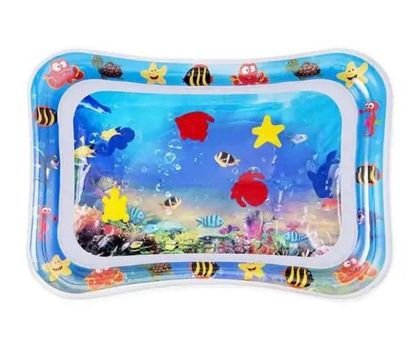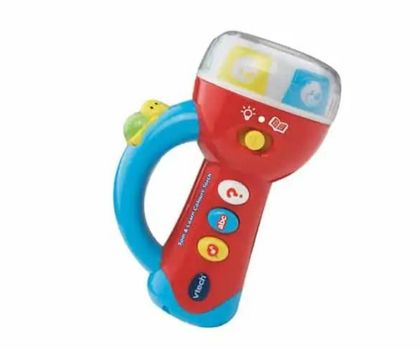Table of Contents
Comparison Table
Product
Title
Features
Price
Premium Pick

Colourful Block Sorter
- Easy to set up
- Four corner seats
- Connects to garden hose
Best Value

Sensory Play Mat
- Fun to Roll around on
- Suitable from 3 months plus
- Extra-Durable

Premium Pick
Colourful Block Sorter
Find out why this product is our choice:
- Easy to set up
- Four corner seats
- Connects to garden hose
Pros
- Easy to Carry Handle
- Development Skills
- Bright Colours
Cons
- Made of hard plastic
Check out the last deal for this product

Best Value
Sensory Play Mat
Find out why we recommend this product:
- Fun to Roll around on
- Suitable from 3 months plus
- Extra-Durable
Pros
- Fun to Roll around on
- Suitable from 3 months plus
- Extra-Durable
Cons
- Could be burst
Check out the last deal for this product

Our Choice
Colourful Torch
Find out why this product is our choice:
- Multiple Colours
- Helps with language
- Animal Names
Pros
- Multiple Colours
- Helps with language
- Animal Names
Cons
- 18 Months Plus
Check out the last deal for this product

Musical Playbook
Find out why we recommend this product:
- Brightly Coloured
- Sounds and Feelings
- Sings Songs
Pros
- Brightly Coloured
- Sounds and Feelings
- Sings Songs
Cons
- Can run out of Batteries
Check out the last deal for this product
Best Toys for Autistic Children Buyers Guide and FAQ
Play is an effective and fruitful method of teaching children especially those with an autism spectrum disorder. Many children enjoy stuffed animals or cuddly toys.
However, ASD children are sensitive to touch, sound and light as they struggle to process sensory information.
Playing with certain toys helps these kids develop their motor and language skills as well as their social interaction and problem-solving skills. As children with ASD crave sensory experience, these toys will definitely engage their sense of vision, touch ad hearing.
Autistic children have favorites, for example, your child might prefer smell over touch or vice versa. Choose the toy according to your child’s preference and it will help him or her focus and calm down.
These toys ensure that your child feels comfortable and eliminates any fear or hesitation as they will have their sensations stimulated. Always ensure to choose the toys that help your child plan, negotiate and share as these are all traits best learned through play.
Notice the kind of behavior your child exhibits on a daily basis and you will get an understanding of their favorite sensory stimulus and accordingly choose the toy that intrigues their favorite sense the most.
Due to their sensory processing disorder, each child gets stimulated differently and they have intolerances towards different textures and voices. You will find the perfect toy for your kid’s needs in the list above.
There are a number of different types of toys including physical activity play toys, educational toys as well as puzzles.
Some of the toys you might want to avoid buying your kid include certain cloth textures which is why it is preferable not to gift your child clothes unless you are sure of the texture they are comfortable with.
Nonetheless, it is never a bad idea to experiment with giving your child “mainstream” toys as this will help them socialise and bond better with other children.
Also, try purchasing toys and games that are multi-sensory to better encourage learning but be careful not to give your child a toy that is too difficult to play with as this will frustrate them.
It is also preferable to give them a few large toys in comparison to many small ones as this will make it easier for them to concentrate.
Not all autistic children have the same preferences; however, there are some common likes such as technical objects like a calculator or a CD player and toys that work at a push of a button.
All toys that promote sensory experiences are always loved by children on the autism spectrum. Below are some of the best toys for kids with autism.
Why do autistic babies need different toys?
Autistic children yearn for sensory inputs all the time.
Every child is different, some crave tactile sensory inputs such as feeling different textures and others prefer to stimulate their proprioceptive systems or sense of movement via spinning or jumping.
The best way to ensure your child is learning and enjoying his or her time is to provide them with sensory toys.
Most kids on the spectrum enjoy sensory toys. If your child is visually oriented, then interesting visual toys such as lamps are your best bet.
Does your child crave to touch a lot of things? Then safe tactile toys for children should be amongst your choices for your kid.
How does Autism Affect Babies
Babies with autism develop at a different rate and do not necessarily develop skills in the same order as typically developing babies.
The baby’s nervous system, growth, and development get adversely affected by the autism spectrum disorder (ASD). Autism has effects on babies’ behaviors in general including delayed language learning, trouble-making, and keeping eye contact.
At an older age, you will notice that they have difficulty holding a conversation and executing basic functioning skills such as reasoning and planning. It also negatively affects their motor skills and sensitivity towards sensory stimuli in general.
What are the signs of Autism in babies?
You can catch the early signs of autism in babies by noticing social, communication and behavioral differences. Some signs include your baby not keeping eye contact or responding to facial expressions.
They also don’t utter any words by 16 months of age and when they start talking, they repeat exactly what others say without understanding the meaning and this behavior is called parroting or echoing.
Other repetitive behaviors babies might exhibit are unusual use of vision or gaze and being obsessed with few or unusual activities by doing them repeatedly over the day. They also seem to not feel any pain or might be unusually very sensitive to or not sensitive at all to all sounds, sights, smells, touch, or textures.
If a young child has ASD, they will not use any gestures on their own like waving to someone without being told to. They will also get extremely upset if they don’t follow a certain routine of eating and sleeping, in the same way, every day.
What to look for when buying toys for children with Autism
Sensory – When choosing a toy for your child, always ensures that it has the ability to fulfil your child’s craving for a sensory feedback.
Sensory toys will help your child focus and relax as well as develop social learning skills like planning, negotiating and sharing. For an autistic child, deformed sensory input can make their life hard in so many ways.
From social interaction to proprioception to even safety, distorted perception along with their inability to communicate can lead to irritability. Intervention using sensory toys will help them make better sense of their environment and make it easier for them to communicate.
Volume Control – Toys with sounds and volume control will aid your child with auditory processing. Toys such as sound puzzles, bells, whistles, talking toys, radio and music boxes are great for children with autism.
Some children with autism are hypersensitive to sounds in general and may highly dislike toys with unpredictable noise or sounds at certain frequencies. This is why it is always a good idea to have toys with volume control to avoid any tantrums or discomfort.
Allowing your child to increase and decrease the volume of their toy using the button will definitely be considered sensory fulfilment to them too.
Visually Appealing – Visually stimulating toys such as those with a screen or that light up will be the perfect entertainment for your child. Autistic kids have a visual fascination with lights, movement, and bright colours.
Try to notice a pattern in your child’s behavior around certain colours. 85% of autistic children typically perceive colours much more intensely in comparison to children that display normal development. Colours with white and grey undertones have a much more calming effect on autistic children in comparison to other colours.
Some children are hypersensitive to bright lights and colours while others are hypersensitive. Understand what makes your child visually more comfortable and choose their toys accordingly.
Difficulty to Play with – Taking your child’s favourite toy away will frustrate them greatly. Similarly, buying them a toy that makes them feel incapable will make them throw tantrums and become angry and aggressive.
Choose a game or a toy that makes them feel enabled or ensure that you are around them when they are playing with a challenging toy in order to assist them to communicate their need for help actively.
Because children at risk for autism may show minimal interest in toys in the first place, make sure you choose a toy they don’t struggle to play with in order to encourage them. Constant prompting and guidance from you as a parent is also recommended.
Potential Of Harm – You always need to make sure that every toy you buy is made of safe materials. Autistic children tend to taste toys as it sometimes fulfills their cravings for sensory feedback and makes them feel safer.
Moreover, consider keeping bathing toys in particular in a bag or a bin away from the bathtub and unavailable and the bathing activity is over and the hair washing is done.
This prevents a power struggle from happening in the bathtub and eliminates the chances of your child hurting themselves on the slippery bathroom floor.

